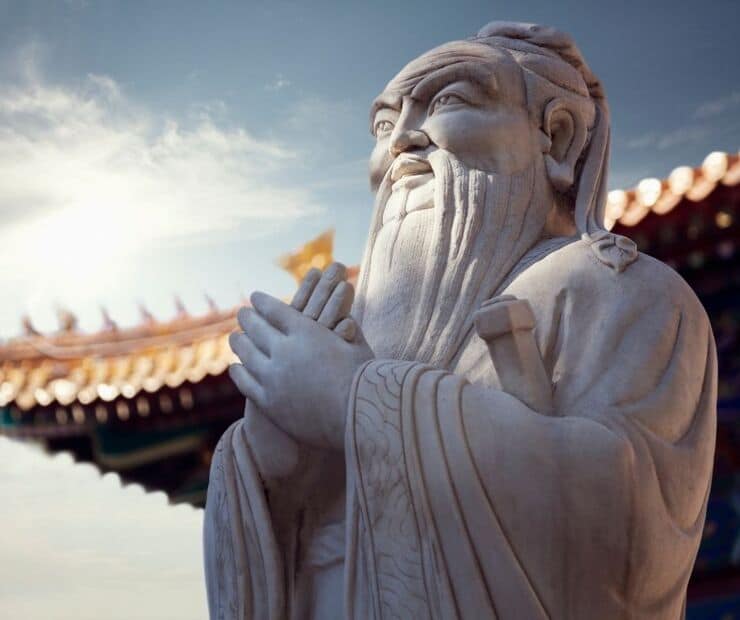
Many people have heard of Confucius, and some call him by his name, Master Kung-Fu-Tze. He founded his ancient Eastern philosophy over 2,500 years ago that still applies to life. There are several principles of Confucianism found in his teachings. Most notably, reciprocity is at the core of the philosophy passed down through time. “Do not do unto others what you would not have them do unto you.”
Simply put, treat others how you wish to be treated. However, the teachings have many other concepts. Master Kung-Fu-Tze focused on virtue, kindness, and building a solid character. There’s a debate on whether Confucianism is a religion, but most agree it’s more of an approach to life.
James Vollbracht wrote The Way of Virtue: An Ancient Wisdom of Confucius. He explores the teachings, giving historical and philosophical insight. Vollbracht also includes a great deal of background information. The book has a Chronology and The Disciples of Master Kung-Fu-Tze for further learning.
Education is at the heart of all Confucian teachings. Master Kung-Fu-Tze had a methodical and orderly approach to life and his lessons. Circa 500 BCE, the philosopher expressed his wisdom to students. Here are some principles and the takeaways of applying Confucianism to life today.
- Reciprocity and Human-Centered Virtues
Reciprocate sincerity and kindness with those you encounter from all walks of life. Treat people with human-centered virtues respectfully. Having a kind heart and being thoughtful is self-empowering. Being virtuous will uplift you and others that you meet. Confucius also taught his students about dealing with divisiveness. He stated, “when all people are educated, the distinction between the classes disappears.” Like his students, you may ask “how” to find balance in a currently polarizing world. Kung-Fu-Tze responded to them by placing his hand on his heart.
- Morals, Ethics, and Strong Character
“The Middle Way” is a Confucian lesson that references dealing with other people. Taking this approach to life places you on the path of virtue and isn’t viewed as a moral high road. Standing in the middle prevents you from descending into improper behaviors. The philosophy focuses on staying balanced and fair, not morally superior. “The Middle Way” allows you to always remain true to yourself. Holding an unchanging standard of morals and authentic virtue unlocks a power within. Acting ethically and practicing fairness builds a strong character.
- Kindness, Small Deeds, and Virtuous Acts
Confucius believed in making it a habit to take part in small acts of kindness regularly. Great things can be accomplished when done well and acting from the heart. A moral person understands the power of small deeds and virtue. At the end of each day, Confucius encouraged students to self-reflect. Ask and answer three simple questions. Have I helped others? Have I been a true friend? Have I passed on what I was taught? Being kind and acting morally are two concepts to build a strong character.
- Self-Discovery and Truthfulness
Confucius believed that people who are honest with themselves could change the world. Being genuine and sincere leads to morality and a path of virtue. Confucius stated, “absolute truth is indestructible.” This philosophy of life is somewhat contagious. Another quote by Confucius is, “Virtue always lives alone. It always attracts company.” Through continued education, you achieve self-discovery. Having morals and integrity costs no money. Students only need to invest time to learn, practice and grow. As you personally develop, you achieve peace and harmony. With self-discovery and virtue, the Confucianism principle of responsibility comes into play. When a student misses their mark, they learn to own their actions.
- Habits and Self-Discipline
People who study and practice the philosophy of Confucianism believe in order. They incorporate habits and self-discipline into their life to act with morals. Being kind and engaging in virtuous acts is an ongoing process. The philosophical teachings focused on the power of rituals or habits. Also, Confucius embraced music as part of his culture. The two together set things right and help individuals find their moral center. A Confucius quote discusses self-discipline, learning, and culture. “A true education in virtue begins with poetry, is strengthened by proper conduct, and is consummated with music.”
- Respect and Manners
Another habit taught by this Eastern philosophy is practicing manners and respecting others. An ethical code of conduct keeps people morally grounded and on the path of virtue. Confucianism lessons apply to families, including the age-old saying “respect your elders.” However, youth is the future and also deserves the same treatment. Regardless of the person, having manners and respecting them is an important practice.
- Willingness to Continue Learning
Those disciplined and self-aware know how to balance life by continuing education. Practicing kindness and continued virtuous acts lead to harmony and peace. Students of Confucianism eventually teach others. A timeless story claims that a final wish of Kung-Fu-Tze was for his lessons to be passed down. Taking time to learn about the philosophy is the most essential step. Revisiting the teachings help students fully understand them. The simplistic lessons of Confucianism need to be actively practiced and shared.
- Other Confucius Teachings
Confucianism focuses not only on personal growth but also on professional development. Vollbracht discusses leadership in The Way of Virtue. He shares lessons on a leader’s character from the ancient teachings. Confucius educated students on justice, culture, and societal matters. The philosopher also believed that the universe was linked to transcendental intelligence. Within your surroundings and nature are harmony, education, and order.
Despite Confucianism being ancient Eastern philosophy, the lessons can be a game-changer today. A student learns, thinks, and acts civilly, which becomes natural with practice. Treating others with kindness and sincerity is a win for humankind. Confucius also focused on endlessly pursuing truth in life. You can read about each lesson more in-depth in Vollbracht’s The Way of Virtue. Also, here’s a great resource and quick read that includes 101 Confucius Quotes.
